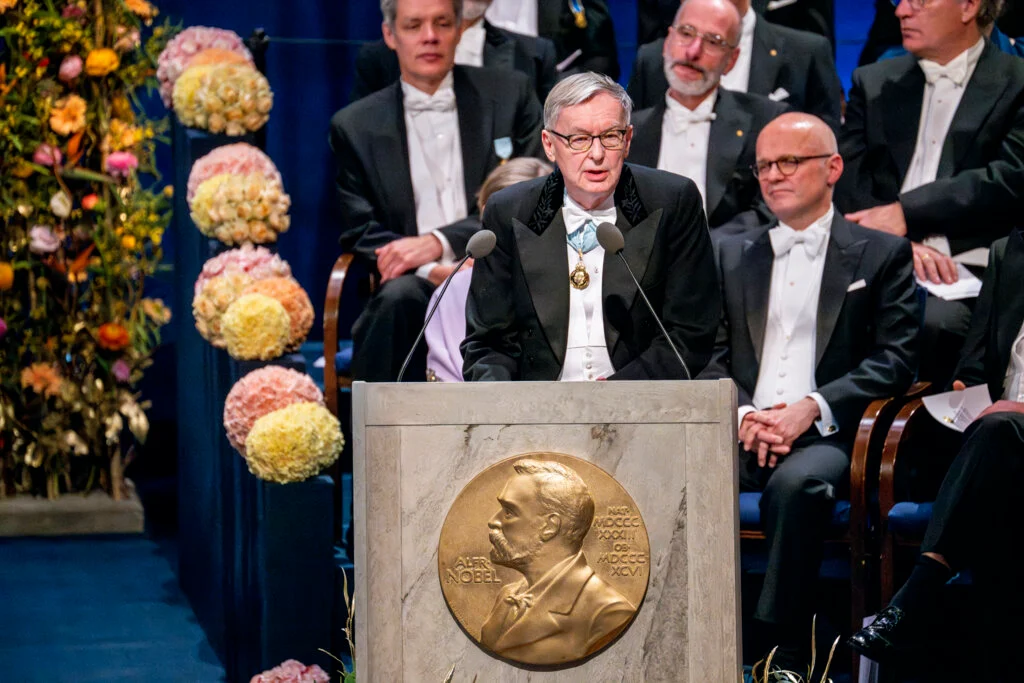Did you Know?
it is possible for someone to be nominated posthumously, meaning they can be nominated after their death. however,the person must have been alive at the time of nomiantion to be eligible to win the nobel prize.
History
Nominations:
The Nobel Prize nominations are highly confidential, and the detailed records of who was nominated, in which category, and for what specific contribution are not publicly released until 50 years after the nomination. This is to preserve the integrity of the process and ensure the privacy of both the nominees and the nominating bodies.This secrecy ensures that individuals are not subjected to public pressure or premature speculation before the official announcement. It also prevents external influence or lobbying, maintaining the integrity of the selection process.Additionally, the confidentiality of the Nobel Prize nomination process encourages a broad and diverse range of nominations, as nominators can propose candidates without fear of personal or professional consequences. This anonymity ensures that nominations are based purely on merit, allowing the selection committees to evaluate candidates impartially. The secrecy also helps safeguard the reputations of those involved, as the details of the nomination process remain private, reducing the risk of misunderstandings or misinterpretations. Ultimately, this practice preserves the Nobel Prize's credibility and upholds its longstanding tradition of recognizing extraordinary contributions to humanity. However, general information about the Nobel Prizes and the categories, along with publicly available information on laureates, can be found. The Nobel Prizes are awarded in the following categories:
Each year, various organizations, including academic institutions, previous laureates, and members of the Swedish Academy, nominate individuals or organizations who have made outstanding contributions in these fields.

Nobel Peace Prize:
The Nobel Peace Prize recognizes individuals, organizations, or movements that have made significant efforts toward peace and the resolution of conflicts. The process for this prize is unique because it is awarded by the Norwegian Nobel Committee, not the Swedish institutions. Nominations can be made by members of national parliaments, professors of political science and international law, and heads of international organizations. The Norwegian Committee reviews the nominations and consults experts before making its decision. As with the other prizes, nomination records are kept confidential for 50 years.
Nobel Prize in Literature:
The Nobel Prize in Literature is awarded to authors, poets, and playwrights whose works have significantly contributed to world literature. Nominations are made by Nobel laureates, members of the Swedish Academy, and other distinguished figures in literature. The Swedish Academy reviews the nominations through its Nobel Committee, which reads and evaluates the body of work of the nominees. The final decision rests with the Academy, and the identities of the nominees are kept secret for 50 years.


Nobel Prize in Physics:
The Nobel Prize in Physics is awarded to individuals who have made groundbreaking contributions to the field of physics. Nominations are made by a select group of qualified nominators, which include previous laureates, professors of physics, and other recognized experts in the field. The Royal Swedish Academy of Sciences appoints a Nobel Committee that reviews the nominations and consults with other experts to assess the scientific value of the work. The Academy makes the final decision. Nomination data for the prize is not publicly released until 50 years later.
Nobel Prize in Chemistry:
The Nobel Prize in Chemistry is awarded to individuals who have made significant advancements in the field of chemistry. Nominations for this prize are submitted by a similar pool of qualified nominators as the Physics Prize, including Nobel laureates, professors of chemistry, and members of scientific institutions. The Royal Swedish Academy of Sciences reviews the nominations through its Nobel Committee, which consults other experts before making recommendations. The final decision is made by the Academy. Like the Physics Prize, the names of nominees are disclosed only 50 years after the award.


Nobel Prize in Physiology or Medicine:
The Nobel Prize in Physiology or Medicine recognizes individuals who have made major contributions to medical science, especially in the understanding of biological processes. Nominations can be made by professors in medicine, Nobel laureates, and scientific institutions. The Karolinska Institute administers the prize, with a Nobel Committee that carefully reviews the nominations and consults with experts in the medical field. The final decision is made by the Institute's board. Nominations and related records remain confidential for 50 years.
Nobel Memorial Prize in Economic Sciences:
This prize, established in 1968 by the Swedish National Bank in memory of Alfred Nobel, recognizes outstanding achievements in economics. Nominations are submitted by qualified nominators such as professors of economics, previous laureates, and economists from international institutions. The Royal Swedish Academy of Sciences oversees the selection process through its Nobel Committee, which evaluates the significance of the candidates' work. As with the other Nobel Prizes, the names of nominees are disclosed only after 50 years.

Diversity and Inclusion in Nominations
There has been criticism in the past for the lack of women and non-Western laureates in some categories, particularly in Physics and Economics. The Nobel Committees have slowly made efforts to address these imbalances, and you could mention some of the groundbreaking female laureates, such as Marie Curie (Chemistry, Physics), Doris Lessing (Literature), or Frances Arnold (Chemistry).
Challenges in Nominations:
Political Influence: The Nobel Peace Prize, in particular, can be politically charged. Nominations often reflect the political landscape at the time, and nominees may be controversial figures with supporters and detractors. For instance, figures like Henry Kissinger, who won the Peace Prize in 1973 for his role in negotiating the Vietnam War ceasefire, have sparked widespread debate due to his association with U.S. military actions during the Vietnam War. Nominating and selecting such figures can create tension, both within the Nobel Committee and internationally.
Nobel Prizes are limited to certain fields: The original prizes covered Physics, Chemistry, Medicine, and Literature, and later, the Peace Prize and the Sveriges Riksbank Prize in Economic Sciences in Memory of Alfred Nobel were added. However, other fields such as mathematics, environmental science, and social sciences are not recognized, which has sparked debates.
Mathematics: The Nobel Prizes do not include a category for Mathematics, leading to speculation about why this was the case, although Nobel's will did not specify a reason. This omission has led to alternative prestigious awards like the Fields Medal and Abel Prize.
Political and ideological influence: Especially in the Peace Prize category, the selection process can be influenced by political considerations. For example, the Peace Prize has been awarded to figures like Henry Kissinger and Aung San Suu Kyi, who have faced criticism for their actions in other areas of their careers. These decisions often lead to public debates about whether the award should recognize achievements in promoting peace or whether it should consider broader human rights records.
Regional biases: The Nobel Prizes have often been critiqued for having a Western-centric bias, with laureates predominantly coming from the United States, Europe, and other developed nations. This reflects historical patterns of research funding, access to scientific resources, and recognition, leaving out scholars from the Global South or less developed regions.
Pressure and expectations: Winning a Nobel Prize can place immense pressure on the laur eates to continue their work, with the expectation that they will keep contributing at the same level of excellence. This can affect their careers, their research trajectory, and their mental well-being.
The Five-Year Rule: Nobel Prizes are often not awarded for work that is too recent. The five-year rule, which means that the prize can only be awarded for work that has stood the test of time, can sometimes lead to confusion or disappointment. For instance, some laureates who were nominated in their lifetime might only be recognized after they have passed away, and some deserving discoveries may not be awarded until much later.
